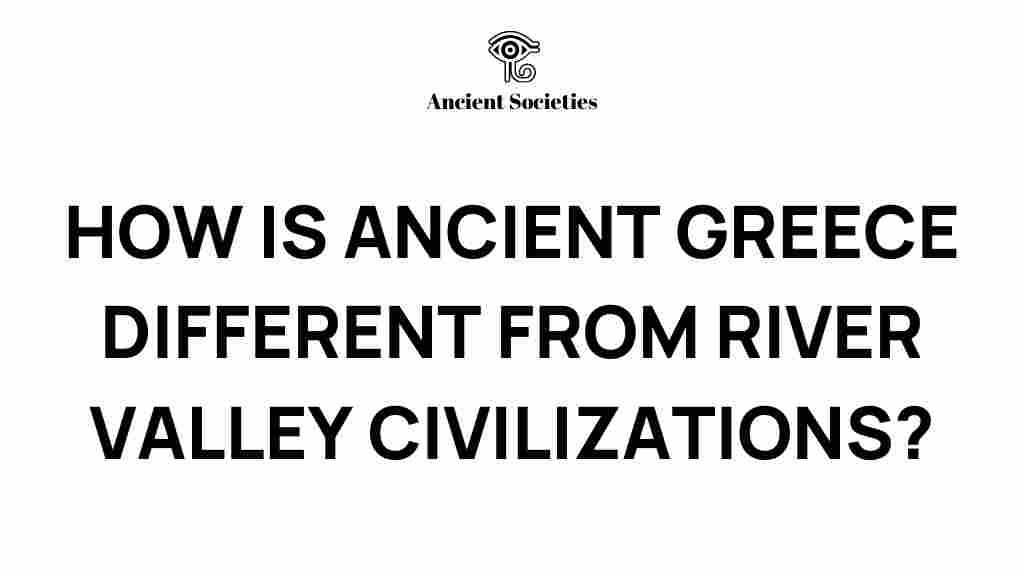Unveiling the Distinctive Threads of Ancient Greece and River Valley Civilizations
The study of history reveals the remarkable tapestry of human development, particularly through the lens of Ancient Greece and the famed River Valley Civilizations. Both of these prominent cultures laid the foundations for modern society, showcasing unique elements of culture, social structures, and advancements in various fields. This article aims to explore the intricacies of these civilizations, drawing comparisons and highlighting their significant contributions to human heritage.
Understanding Ancient Greece
Ancient Greece is often hailed as the cradle of Western civilization. Its influence on philosophy, politics, art, and science is profound and enduring. Key features of this civilization include:
- City-States: The emergence of city-states such as Athens, Sparta, and Corinth.
- Democracy: The development of democratic principles, particularly in Athens.
- Philosophy: The philosophical contributions of figures like Socrates, Plato, and Aristotle.
- Art and Architecture: The creation of iconic structures like the Parthenon and innovations in sculpture.
Exploring River Valley Civilizations
In contrast, the River Valley Civilizations—including the Mesopotamians, Egyptians, Indus Valley, and Chinese—emerged in fertile areas near rivers, which facilitated agriculture and trade. Key characteristics include:
- Agricultural Innovation: The development of irrigation systems and crop cultivation.
- Writing Systems: The invention of cuneiform in Mesopotamia and hieroglyphs in Egypt.
- Centralized Governments: The establishment of powerful rulers and bureaucracies.
- Religious Practices: The construction of temples and the worship of gods as central to society.
Comparative Analysis of Cultures
When comparing Ancient Greece and River Valley Civilizations, we observe both similarities and differences that help us understand their respective contexts:
Similarities
- Complex Societies: Both cultures exhibited complex social structures with distinct classes.
- Religious Beliefs: Religion played a pivotal role in both societies, influencing daily life and governance.
- Artistic Expression: Both civilizations produced remarkable art that reflected their values and beliefs.
Differences
- Political Structures: While Ancient Greece is known for its early form of democracy, River Valley Civilizations typically featured centralized monarchies.
- Geographic Influence: The geography of Greece, with its mountainous terrain, led to the formation of independent city-states, unlike the more unified territorial states of River Valley Civilizations.
- Philosophical Thought: Ancient Greece emphasized rationalism and inquiry, whereas River Valley civilizations often focused on religious and mythological explanations.
Archaeological Insights
Archaeology plays a vital role in unveiling the past of both Ancient Greece and River Valley Civilizations. Through excavations, artifacts, and ancient texts, researchers have pieced together the lives of these societies. Key archaeological findings include:
- The Acropolis: In Athens, this ancient citadel showcases the architectural prowess of the Greeks.
- Indus Valley Seals: These artifacts provide insight into trade and social structure in the Indus Valley.
- Pyramids of Giza: These monumental structures reflect the engineering capabilities and religious beliefs of the Egyptians.
Heritage and Legacy
The legacies of both Ancient Greece and River Valley Civilizations continue to influence modern society. Their contributions to governance, philosophy, art, and technology are evident in contemporary culture. Some notable impacts include:
- Democracy: The democratic ideals of Ancient Greece serve as a foundation for many modern governments.
- Legal Systems: The codification of laws seen in River Valley Civilizations laid groundwork for modern legal frameworks.
- Scientific Inquiry: The emphasis on observation and rational thought from the Greeks is central to the scientific method used today.
Step-by-Step: How These Civilizations Shaped Our World
Understanding the influence of Ancient Greece and River Valley Civilizations can be achieved through a structured perspective:
- Identify Key Contributions: Recognize the specific advancements in politics, philosophy, and arts.
- Analyze Cultural Practices: Examine religious beliefs, social structures, and daily life.
- Explore Archaeological Findings: Investigate artifacts that reveal insights into these civilizations.
- Understand Legacy: Assess how these contributions have been carried into present-day society.
Troubleshooting Common Misconceptions
In studying Ancient Greece and River Valley Civilizations, several misconceptions may arise. Here are some tips to clarify these issues:
Misconception 1: Ancient Greece was the only influential civilization.
Correction: While Ancient Greece had a significant impact, the River Valley Civilizations also contributed immensely to human development in various fields such as writing, agriculture, and governance.
Misconception 2: All River Valley Civilizations were the same.
Correction: Each River Valley Civilization had its unique characteristics, influenced by geography, culture, and societal needs.
Misconception 3: The advancements of these civilizations are irrelevant today.
Correction: Many principles from these ancient cultures remain integral to modern governance, philosophy, and science.
Conclusion
In conclusion, the exploration of Ancient Greece and River Valley Civilizations reveals a rich tapestry of human history that continues to shape our modern world. By understanding their distinct yet interconnected contributions to culture, society, and civilization, we can appreciate the profound impact they have had on our heritage. As we delve deeper into archaeological findings and comparative studies, we ensure that the legacy of these ancient civilizations endures, illuminating the path for future generations. For further reading on ancient civilizations, visit this informative resource.
If you’re interested in exploring more about how history influences our current society, check out this insightful article.
This article is in the category History and created by AncientSocieties Team
